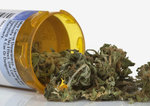VIENNA — Local and area leaders were given a tour of the new Hippos marijuana cultivation facility in Vienna last week. It was an opportunity to see first-hand an operation which is competing …
This item is available in full to subscribers.
We have recently launched a new and improved website. To continue reading, you will need to either log into your subscriber account, or purchase a new subscription.
If you are a current print subscriber, you can set up a free website account by clicking here.
Otherwise, click here to view your options for subscribing.
Please log in to continue |
|


VIENNA — Local and area leaders were given a tour of the new Hippos marijuana cultivation facility in Vienna last week. It was an opportunity to see first-hand an operation which is competing in the fastest growing industry in the United States.
Hippos CEO Nick Rinella and Office Administrator and Inventory/Compliance Manager Sherry James gave a tour for Maries County Presiding Commissioner Victor Stratman, Missouri State Representatives Bruce Sassmann of Bland—62nd, Ron Copeland of Salem—143rd, and Lisa Thomas of Lake Ozark—124th, Mid American Bank Vice President Vicki Nelson, and this Advocate reporter. Following the tour, which lasted over two hours, the participants all said they were impressed with Rinella’s professionalism and the state of the art indoor marijuana cultivation system Hippos has put into place in Vienna, Missouri.
Getting started
Rinella said currently the Vienna Hippos cultivation facility employs 35 to 40 people. When Hippos first took ownership of the former spec building along Highway V in Vienna, he said it was a 16,000 square foot “shell of a building.” The company found the big, vacant building in Vienna when it did a search in Missouri. Rinella said he looked at 80 properties during his search. He wanted to have a central location for optimal logistics. He told the tour group he has a background in beverage distribution as he family has owned a distribution company for many years and he grew up working there. Rinella said he developed the first licensed cannabis business in the state of California. But he wanted to come back to his home area. He was raised in Quincy, Illinois.
During his Missouri search for the best location, he looked for the best fit with the property and the community. He said “it’s a tough business” and not an easy one. He’s had to work hard and appreciates how the Vienna and Maries County community welcomed him with open arms. He’s from a small community and appreciates what it has to offer.
The Vienna City Council did welcome Rinella and his new business. The council members saw it as an opportunity for Vienna to get a number of new, good paying jobs in town and the increased economic activity new jobs bring to a community. Also, the spec building had been given to the city by the Vienna Community Development Corporation (VCDC) as that group thought economic development would be more appropriate for the city council to do. The city sold the spec building and 18 acres to Hippos with conditions of investment. Hippos met the challenge and soon reached the investment portal of $6 million and the building now belongs to Hippos.
Hippos has a cultivation facility in Vienna. Rinella detailed the types of cannabis licenses offered in the state of Missouri. They include cultivation, transport, dispensary, and manufacturing.
Hippos Cannabis plans to open a dispensary in Columbia, Chesterfield and Springfield. The Chesterfield dispensary will be the first to open.
There also is lab testing, which is done for Hippos in Kansas City. The cannabis is tested for pesticides, heavy metals, herbicides, and any type of substance that can be applied to a plant. Testing is very stringent and they have to test every 15 pounds of cannabis. He said in California the state requires testing every 50 pounds of cannabis. In one flower bay 500 pounds are produced. Rinella said the lab people come in and grab it and take it to the lab facility.
At the Vienna facility, they make jarred cannabis flower buds and pre-rolled joints.
Medicinal reasons
He told the group that cannabis is for fun, but for himself, he has a personal experience with cannabis. He had lime disease and “cannabis helped me make it to the next day” while he was getting treatment. He said his pain was at a 12. He still fights it. It was the cannabis that helped him wake up in the morning and be productive, adding he feels like it saved his life. About 80 percent of the people who buy cannabis do so for medicinal reasons, Rinella said.
The tour
The group began in the employee break area and conference room. The visitors needed surgical-type booties over their shoes and white jackets for cleanliness and to not touch anything with their street clothes. There is enhanced security inside the facility. No phones or cameras were allowed.
The first room was the server room with data racks of technology. Everything is automated. Rinella said there are cameras everywhere. He said the facility’s electric bill is about $47,000 a month.
The visitors were able to see the cannabis plants in all stages of the growing process. It began with the stock plant room, which is where “the mom’s go.” Rinella said Hippos is looking for big yields. When the lights are on all the time, the plants grow two to three inches a day. A growing cycle is about four months and they get about four and a half growing cycles a year. Cleanliness is very important. Rinella said the employees do what Mother Nature does, but inside. They choose the plants that are growing the best and which strains of cannabis are the best medically.
In the nursery are about 2,300 plants of cloned cuttings that are planted in sterile cement GRO-Blocks. These blocks contain what looks and feels like insulation. Rinella said after the blocks are used, they have to shed them and it all is thrown away. They don’t like doing this but the state requires it. One of the state reps said it would be a good problem solving project for engineers to find a way to repurpose the GRO-Blocks rather than them ending up in the landfill.
Rinella showed the visitors the water room, which had several very large containers of water. The room also had computers and data racks. He said there are smart engineers, indoor agriculture experts, who since 2010 have brought a lot of innovation to the cannabis industry. He called the process fertigation.
Though the Hippos facility uses a lot of electricity each month, it only uses about 10,000 gallons of water, purchased from the city of Vienna. The water is recycled.
For the new cannabis facility, Hippos used all of the existing building and added on to it, too.
The marijuana plants they use to produce their product are all female because the females produce the buds. The leaves on the plants are of no value to them; it’s the buds they want and its what they sell.
He explained a unique feature of cannabis in that the plants uptake everything in the environment. They can soak up radiation, Rinella said, and marijuana plants were used at Chernobyl to do this.
The female plants are self-pollinating. They do what plants have to in order to survive, even under stress. With heat and light they begin to self pollinate. The process is very interesting.
There are four greenhouses. The light is controlled and some of the rooms have a glass ceiling to use the sun, which exposure can be controlled with blackout curtains and shade curtains. The light is defused and dispersed evenly. Rinella said there is good sun in Maries County. All of the rooms are very clean.
The facility’s electrical system is state of the art as is their data technology.
There are 2,200 plants in a room and there are four different strains. When the plants start flowering, the light is 12 hours on and 12 hours off. A couple of the grow rooms were very, very bright.
Output and packaging
Hippos has applied for more permits to expand their growing space to 90,000 square feet. There are 60 cultivation licenses in Missouri now.
One of the state reps asked about the output and its value. Rinella said 2,200 plants will produce 500 to 600 pounds of buds, which, depending on the quality, is worth $1 to 1.2 million, minus expenses.
They have a cure room, which sucks out 50 percent of the moisture. The visitors saw the trim room with people sitting at a table cutting the leaves away form the buds. Rinella said the trimmings are used to make gummies.
Next the buds go to the packaging room, which is automated and has a set of scales. The automated machine can process the buds into 25 jars a minute, much faster than any person could do. Their brand is OG Yields and the containers of 3.56 grams of cannabis buds is labeled Sundro. The 3.56 gram container of marijuana sells from $40 to $60.
There also is a marijuana joint rolling machine that can make 702 joints minute. Each joint is then put in its own plastic container.
Cultivation pros and cons
Rinella talked about the pros and cons of cultivation. Indoors the pros to cultivation are the ability to control CO2, pests, temperature and humidity, which yields tighter buds with more THC and higher yields.
Outdoor pros and cons include free light, full spectrum light, lower capital investment and production costs, but looser buds and lower THC.
OG Yields sealed glass roof is the only one in Missouri. It and their other innovations allows for environmental control and full spectrum light, but the initial investment costs are high.
Besides Rinella, who is the CEO, also working with the company is Ben Friedenberg, who is the director of cultivation. He is highly intelligent. He’s from Missouri. They have reached out to the University of Missouri-Columbia to engage university students in this new indoor agricultural product process. “It’s where the world is going,” he said. Other leaders in the company include Lindsay Lockhart who is director of branding and retail, and Mike Caruso who serves as director of security. The company has a high level of professionalism. They have put money behind their Sundros and OG Yields branding.
Jobs
The Hippos building is on 18 acres of company-owned land. Rinella said they would like to have enough square feet to plant as much cannabis as they can. There are others areas to expand into. He said they have the capability to do baked goods at the Vienna facility, they just haven’t implemented it yet.
In the future, when the facility is running at where they want to be, Rinella said there could be 300 to 500 employees at the Vienna facility. “We have to grow into it,” he said, adding that currently “labor is a problem.”
When asked what qualifications he wants in a Hippos employee, Rinella said a responsible person who will show up to work and work hard. He thinks by next year they will have 50 to 60 employees. They pay $15 an hour and provide health insurance. Because this is a new and growing industry, Rinella said there is room for people to move up the employment ladder internally. It’s a skill set people can’t learn just anywhere and they can get the experience at the Vienna facility. There are 30 to 40 people working there already and this has to have had a positive impact on the community. The community has been receptive to the company.
Rinella said it’s the fastest growing industry in the country and they plan to be working in Vienna for a long time. “This place isn’t going anywhere.”